Suzuki S-Cross VS VW T-Roc
In the competitive crossover segment, the Suzuki S-Cross and VW T-Roc stand out with their unique offerings. The S-Cross impresses with its practicality and robust all-wheel-drive capabilities, making it a versatile choice for adventure-seekers. Meanwhile, the T-Roc captivates with its stylish design and premium interior, appealing to those looking for a more refined driving experience.
Suzuki S-Cross
The Suzuki S-Cross emerges as a versatile crossover, blending urban agility with a rugged presence suited for diverse terrains. Its design combines sleek, modern aesthetics with practicality, offering a spacious interior that comfortably accommodates passengers and cargo for varied journeys. Drivers will appreciate the advanced technology features that enhance both driving pleasure and safety, making the S-Cross a well-rounded option for those seeking reliability and style in a compact SUV.
detailsVW T-Roc
The VW T-Roc seamlessly blends stylish design with practical functionality, making it an ideal choice for those who enjoy both urban and countryside driving. Its modern interior features intuitive technology and comfortable seating, enhancing the overall driving experience. With its robust build and dynamic performance, the T-Roc is equipped to handle various road conditions with confidence.
detailsThe automotive market is brimming with intriguing options, especially when it comes to compact SUVs. Today, we delve into a comparison between the Suzuki S-Cross and the Volkswagen T-Roc, both of which have made significant strides in 2024. Each SUV carries distinct features, but which one better aligns with the desires of modern drivers? Let's explore the technical aspects and innovations of both vehicles.
Design and Dimensions
The Suzuki S-Cross boasts a robust and muscular design, measuring 4300mm in length, 1785mm in width, and standing 1580mm tall. Its five-door configuration offers practicality for families or those needing extra space. On the other hand, the VW T-Roc presents a slightly smaller footprint with a length of 4236mm and a width of 1819mm, but it comes in various heights, ranging from 1527mm to 1584mm depending on the variant. The T-Roc's slick design prioritizes a sporty appearance, appealing particularly to younger consumers.
Powertrains and Performance
When it comes to engine options, the Suzuki S-Cross offers two variants: a Full Hybrid and a Petrol Mild Hybrid (MHEV), with power outputs of 116 and 129 HP respectively. The S-Cross features both Front-Wheel Drive and All-Wheel Drive configurations, delivering a 0-100 km/h acceleration range of 9.5 seconds. In contrast, the VW T-Roc flaunts a broader array of powertrains. Its offerings include petrol engines generating 115 to 300 HP and diesel options reaching up to 1968cc. With various settings for performance, the T-Roc achieves acceleration as impressive as 4.9 seconds for its highest-performing variant. This extensive range allows drivers to choose a model that best fits their driving style.
Fuel Efficiency
Fuel consumption is a critical factor for many buyers, and here the S-Cross boasts an edge in efficiency, with figures ranging from 5.1 to 5.8 L/100km. Its hybrid tech significantly lowers CO2 emissions, with ratings around 116 to 130 g/km. Meanwhile, the T-Roc's consumption varies based on its engine options, ranging from 4.7 to 8.5 L/100km, and CO2 emissions can climb up to 194 g/km—reflecting the potential trade-off for the higher performance variants.
Comfort and Interior Features
Both SUVs are designed with 5 occupant capacity in mind, but the T-Roc offers a more customizable interior. The trunk space slightly favors the T-Roc as well, providing 445L compared to the S-Cross's 430L. Technologically, both models come equipped with modern infotainment systems, though the T-Roc's high-end trims include a digital cockpit that enhances user experience. The S-Cross, while innovative with its infotainment, may not match VW's level of technological sophistication.
Safety and Innovations
Safety is paramount for any vehicle, and both the Suzuki S-Cross and VW T-Roc come equipped with comprehensive safety features. The S-Cross offers advanced driver-assistance systems such as adaptive cruise control and lane keep assist, while the VW T-Roc competes fiercely with a robust suite of drivers’ aids including automatic emergency braking and pedestrian detection. Both models are built with a focus on keeping occupants safe, but VW's reputation for engineering may give it a slight edge in perceived safety technology.
Final Verdict
Ultimately, the choice between the Suzuki S-Cross and the Volkswagen T-Roc may hinge on the driver's specific needs. If you prioritize fuel efficiency and hybrid technology, the S-Cross could be your ideal partner. However, if performance and cutting-edge technology are at the top of your list, the T-Roc stands ready to impress. Both vehicles exemplify the capabilities of modern compact SUVs, yet the decision comes down to individual tastes and driving preferences.
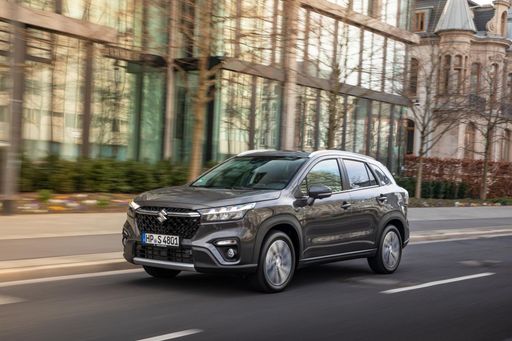 @ Suzuki
@ Suzuki
 @ Suzuki
@ Suzuki
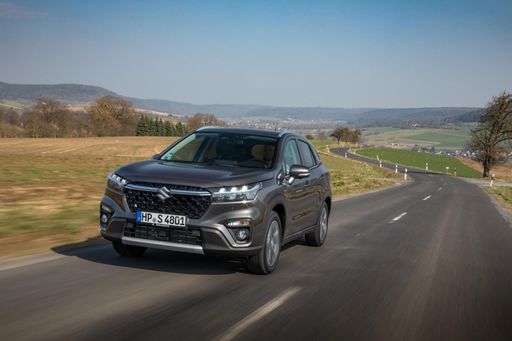 @ Suzuki
@ Suzuki
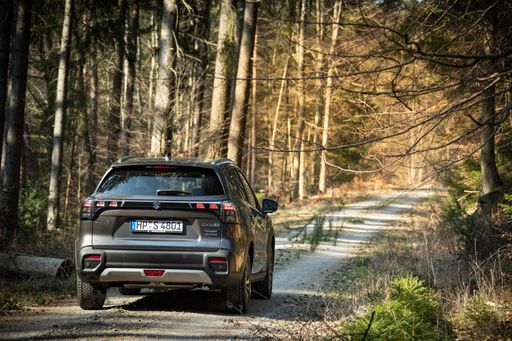 @ Suzuki
@ Suzuki
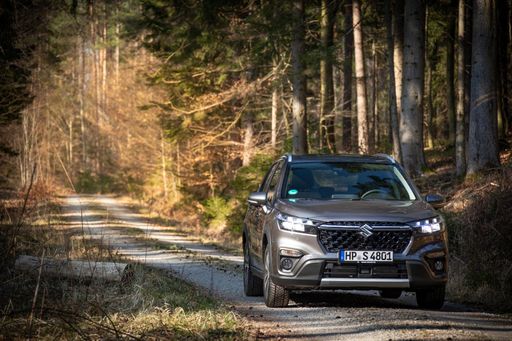 @ Suzuki
@ Suzuki
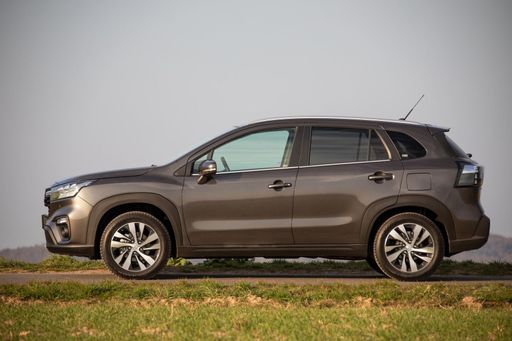 @ Suzuki
@ Suzuki
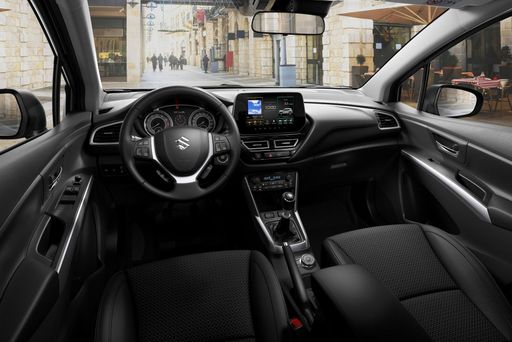 @ Suzuki
@ Suzuki
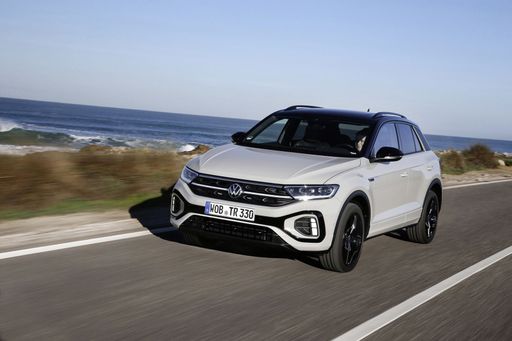 @ Volkswagen
@ Volkswagen
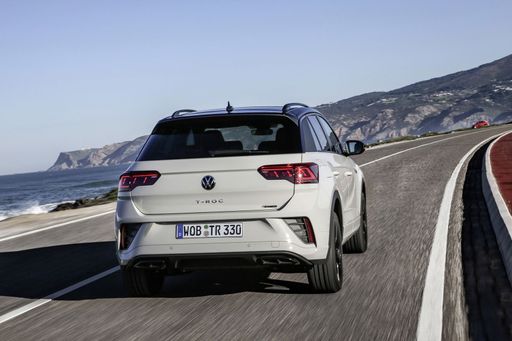 @ Volkswagen
@ Volkswagen
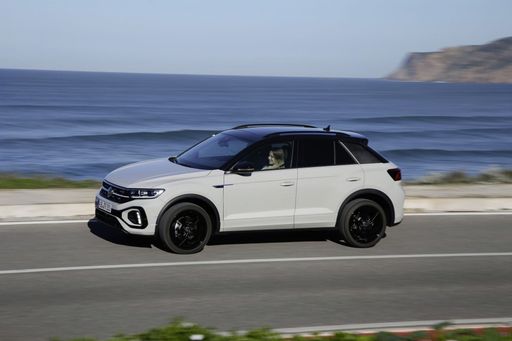 @ Volkswagen
@ Volkswagen
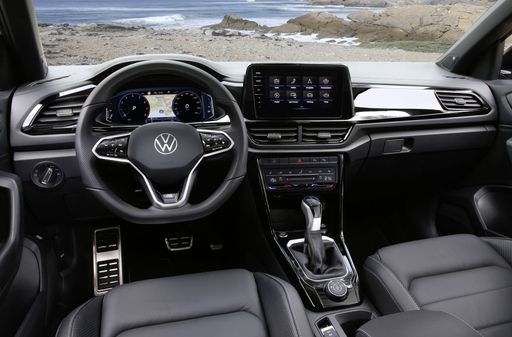 @ Volkswagen
@ Volkswagen

|

|
|
|
|
Costs and Consumption |
|
|---|---|
|
Price
about 26900 - 33700
£
|
Price
about 23900 - 45500
£
|
|
Consumption L/100km
5.1 - 5.8
L
|
Consumption L/100km
4.7 - 8.5
L
|
|
Consumption kWh/100km
-
|
Consumption kWh/100km
-
|
|
Electric Range
-
|
Electric Range
-
|
|
Battery Capacity
-
|
Battery Capacity
-
|
|
co2
116 - 131
g/km
|
co2
125 - 194
g/km
|
|
Fuel tank capacity
47
L
|
Fuel tank capacity
50 - 55
L
|
Dimensions and Body |
|
|
Body Type
SUV
|
Body Type
SUV
|
|
Seats
5
|
Seats
4 - 5
|
|
Doors
5
|
Doors
2 - 5
|
|
Curb weight
1280 - 1435
kg
|
Curb weight
1304 - 1578
kg
|
|
Trunk capacity
430
L
|
Trunk capacity
284 - 445
L
|
|
Length
4300
mm
|
Length
4236 - 4271
mm
|
|
Width
1785
mm
|
Width
1811 - 1819
mm
|
|
Height
1580
mm
|
Height
1527 - 1584
mm
|
|
Payload
375 - 405
kg
|
Payload
368 - 509
kg
|
Engine and Performance |
|
|
Engine Type
Full Hybrid, Petrol MHEV
|
Engine Type
Petrol, Diesel
|
|
Transmission
Automatic, Manuel
|
Transmission
Manuel, Automatic
|
|
Transmission Detail
Automated Manual, Manual Gearbox
|
Transmission Detail
Manual Gearbox, Automat. Schaltgetriebe (Doppelkupplung)
|
|
Drive Type
Front-Wheel Drive, All-Wheel Drive
|
Drive Type
Front-Wheel Drive, All-Wheel Drive
|
|
Power HP
116 - 129
HP
|
Power HP
115 - 300
HP
|
|
Acceleration 0-100km/h
9.5
s
|
Acceleration 0-100km/h
4.9 - 12.3
s
|
|
Max Speed
175 - 195
km/h
|
Max Speed
187 - 250
km/h
|
|
Torque
235
Nm
|
Torque
200 - 400
Nm
|
|
Number of Cylinders
4
|
Number of Cylinders
3 - 4
|
|
Power kW
85 - 95
kW
|
Power kW
85 - 221
kW
|
|
Engine capacity
1373 - 1462
cm3
|
Engine capacity
999 - 1984
cm3
|
|
Top speed
175 - 195
km/h
|
Top speed
187 - 250
km/h
|
General |
|
|
Model Year
2024
|
Model Year
2024
|
|
CO2 Efficiency Class
D
|
CO2 Efficiency Class
D, E, F, G
|
|
Brand
Suzuki
|
Brand
VW
|
Suzuki S-Cross
Introducing the Versatile Suzuki S-Cross
The Suzuki S-Cross stands out as a remarkable offering in the competitive SUV market, combining practicality with modern technology. This car is designed to cater to a diverse range of drivers, offering innovative hybrid technology alongside a comfortable and spacious interior.
Efficient Performance: The Heart of the S-Cross
At the core of the Suzuki S-Cross are its hybrid engine options. Customers can choose between a mild-hybrid or a full-hybrid engine, which both provide impressive fuel efficiency and driveability. The mild-hybrid 1.4 Boosterjet comes with a manual transmission, while the 1.5 Dualjet full-hybrid offers an automatic option. This flexibility ensures that there's an S-Cross model for everyone.
Technical Brilliance and Engineering
The Suzuki S-Cross excels with a range of technical specifications. Offering between 116 to 129 PS, the vehicle also boasts a CO2 efficiency class of D, maintaining an eco-friendly performance with CO2 emissions ranging from 118 to 132 g/km. With a top speed of up to 195 km/h and a nimble 0-100 km/h acceleration of just 9.5 seconds, the S-Cross demonstrates dynamic capability without compromising on environmental consciousness.
Innovative Design and Spacious Comfort
The exterior dimensions, with a length of 4300 mm, a width of 1785 mm, and a height of 1580 mm, provide a substantial presence while offering a spacious interior. The boot space of 430 litres, combined with a seating capacity for five, ensures that the S-Cross is as practical as it is comfortable.
Driving Experience and Versatility
The S-Cross provides a choice between front-wheel drive and the all-terrain ALLGRIP all-wheel-drive system, allowing for flexibility depending on the driver's needs. The suspension and handling have been finely tuned to deliver a smooth driving experience across various conditions, further underscoring the vehicle's versatility.
Cost Efficiency and Ownership
When it comes to cost, the Suzuki S-Cross offers competitive pricing, with monthly costs ranging from €909 to €1045 and an economical cost per kilometre of 36.4 to 41.8 cents. This makes it an attractive option for those seeking cost-effective motoring without sacrificing performance or style.
Conclusion
The Suzuki S-Cross remains an impressive contender in the SUV segment, offering a blend of efficient hybrid engines, practical design, and state-of-the-art technology. Whether you're navigating city streets or exploring off the beaten path, the S-Cross provides a reliable and stylish driving solution.
VW T-Roc
The VW T-Roc: A Blend of Style and Innovation
The Volkswagen T-Roc stands out in the competitive compact SUV segment, offering a dynamic combination of innovative technology and stylish design. The model has evolved since its inception, embracing new features and engineering advancements that appeal to a broad spectrum of drivers.
Engine Performance and Efficiency
The VW T-Roc provides an impressive range of engine options to meet various driving preferences. From the economical 1.0 TSI petrol engines to the robust 2.0 TDI diesels, there’s an engine to match every need. The power output spans from 115 PS to a thrilling 300 PS in the T-Roc R variant. Fuel efficiency is another highlight, with consumption figures ranging between 4.7 and 8.5 L/100 km, making it a practical choice for both city and long-distance driving.
Advanced Technology and Safety Features
Volkswagen has equipped the T-Roc with state-of-the-art technology to enhance both convenience and safety. The latest models include advanced driver assistance systems, such as adaptive cruise control and lane-keeping assist, which provide a safer driving experience. Additionally, the intuitive infotainment system supports a seamless connection to smartphones via Apple CarPlay and Android Auto.
Design and Customisation
The T-Roc’s design is bold and contemporary, reflecting its sporty nature. With a wide array of customisation options, including various trim levels like Life, Style, and the sporty R-Line, there are plenty of opportunities for personal expression. Both the interior and exterior can be tailored, with choices ranging from colour accents to different upholstery options, ensuring each T-Roc feels unique to its owner.
Spacious Interior and Practicality
Despite its compact exterior dimensions, the T-Roc offers a surprisingly spacious interior. It accommodates between four and five passengers comfortably, with ample legroom and headroom. The flexibility extends to the boot space, which ranges from 284 to 445 litres, depending on the configuration, providing practical storage capacity for everyday use or weekend getaways.
Conclusion: A Competitive SUV Choice
Overall, the VW T-Roc continues to be a strong contender in the compact SUV market, combining innovative features, efficient engines, and a distinctive design. It appeals to those looking for versatility and performance in a stylish package, making it an attractive option for both families and individual adventurers alike.
